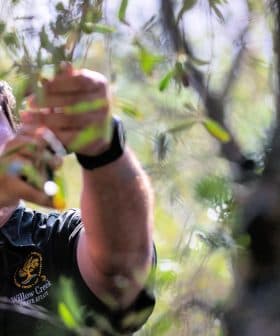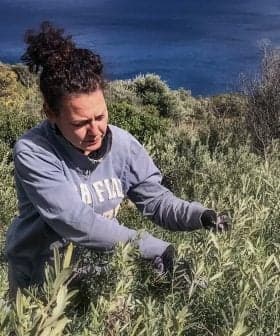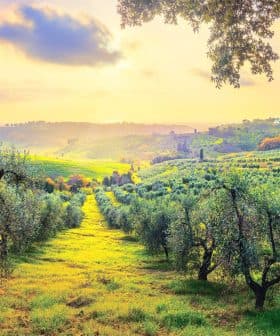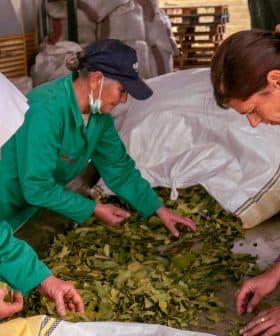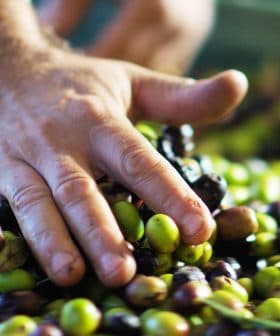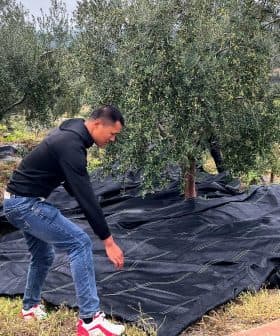Saudi Arabia to Build Asia’s Largest Olive Mill
NADEC, the largest ecological olive oil producer in Saudi Arabia and the Middle East, will build the largest olive mill in Asia to boost its production.
 Photo courtesy of B Alotaby
Photo courtesy of B AlotabySpain’s Grupo GEA and the National Agricultural Development Company (NADEC) have agreed to build Asia’s largest olive mill in the province of Al-Jouf, Saudi Arabia, where NADEC is planting five million olive trees on 7,400 acres, primarily Picual trees. The state-of-the-art mill, costing over €3 million, will be operational in six months and represents a collaboration between Spain and Saudi Arabia to strengthen the latter’s olive and olive oil industries, with research projects planned to improve production capacity.
Spain’s Grupo GEA and the National Agricultural Development Company (NADEC), the largest ecological olive oil producer in Saudi Arabia and the Middle East, have signed an agreement to build Asia’s largest olive mill.
The mill will be located in the province of Al-Jouf, which is situated in the north of the country and is in close proximity to where NADEC is in the process of planting five million olive trees on 7,400 acres.
The majority of the olive trees planted will be Picual, in what is expected to be the world’s largest olive orchard, which features super intensive cultivation with modern drip irrigation systems.
See Also:Africa and the Middle EastThe state-of-the art oil mill, which is expected to be operational in six months, is a turnkey project with a cost that exceeds €3 million ($3.41 million).
The project represents a new stage in the relationship between NADEC and GEA, which in 2016 completed the first phase of this project. With the second phase, GEA will deliver an olive oil mill offering an integrated solution that encompasses civil and automation engineering, processing, training and the required industrial equipment.
The processing lines have been built to respond to different requirements, depending on national traditions and the size of the harvest. These factors will dictate which kind of production methods are chosen.
GEA supplies complete processing lines from taking in and cleaning of the olives to milling, malaxing (continuous or batch,) separation and decanting. Once oil is obtained the processing lines can also handle treating pomace as well as water. The tailor-made systems have also been designed in order to obtain the maximum possible yield and quality, while minimizing water consumption.
The mill will be built in Úbeda, Andalusia, and then transported to Saudi Arabia. GEA’s project will bring together the expertise of several machinery manufacturers from Spain to craft the integrated solution that sets apart this turnkey project from other mills in the region.
Saudi Arabia began to plant olive trees back in 2007 in Al-Jouf in order to supply its domestic consumption. According to olive expert, Juan Vilar, by 2018 Saudi Arabia had planted nearly 52,000 acres of olive groves.
Desert areas divide olive groves, located north and south of Saudi Arabia, where olive trees are handled with great respect because of their spiritual value in Islam. Most of Saudi Arabia has a desert climate with extremely low rainfall and extreme temperature differences between day and night.
Al-Jouf is considered the kingdom’s olive resort, with a rich cultural heritage and diverse natural environment which makes it one of Saudi Arabia’s top tourist destinations.
Saudi Arabia is home to three of the world’s largest modern olive groves in terms of density, dimension and cultivation techniques. Cultivation in the country is completely mechanized. Almost 80 percent of the Kingdom’s olive cultivation is geared toward olive oil production and the remaining 20 percent to table olives.
The construction of this olive mill is a new stage in a working relationship between Spain and Saudi Arabia toward the consolidation of the latter’s olive and olive oil industries. Al-Jouf’s University and the University of Jaén are collaborating in research topics related to the olive sector to improve production capacity.
A total of 21 research projects are planned as part of this agreement responsible for the creation of an Advanced Center for Olive and Olive Oil Studies, and the transfer of technology and technical knowledge.


